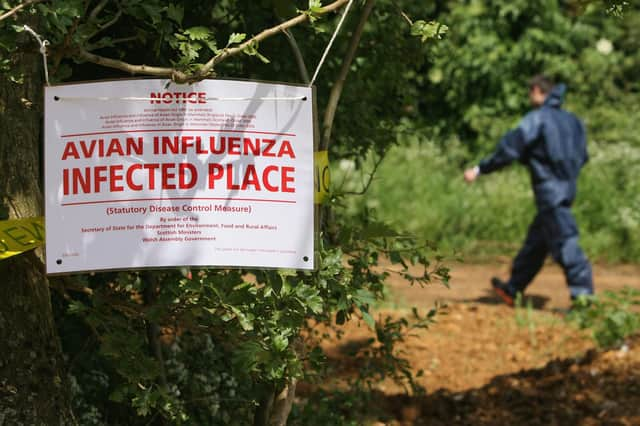Huge bird flu outbreak among poultry could be the source of another human pandemic – Professor Eleanor Riley


But this time it is chickens (and turkeys, ducks and geese) that are locked up, not people, and the deadly virus is a highly pathogenic strain of avian influenza. This is the second winter in a row that avian influenza has caused major outbreaks in domesticated birds across Europe and North America.
Avian influenza is endemic in wild ducks, geese and swans and – just like Covid – infections can be asymptomatic, allowing infected birds to spread the virus during their annual seasonal migrations.
Advertisement
Hide AdAdvertisement
Hide AdLarge numbers of wild fowl migrate from Arctic and sub-Arctic regions to more densely populated areas of Europe and North America every autumn, overwintering on estuaries and wetlands.
The annual spectacle of hundreds of thousands of birds grazing in fields and foraging on mud flats is a treat for birdwatchers but brings a genuine sense of alarm to the nation’s chicken farmers whose livelihoods depend on preventing these wild birds from infecting their flocks with influenza.
If avian influenza gets into a poultry farm, the entire flock has to be slaughtered to prevent the disease spreading to other farms. Dead swans, geese, ducks, gulls and raptors are routinely tested for influenza infection. During the 2020/21 winter, more than 2,000 dead wild birds were found to be carrying a highly pathogenic strain of the virus in Europe and infections on farms led to the slaughter of more than 20 million domestic poultry.
The outbreak this winter dwarfed all previous outbreaks; more than 800 infected wild birds were found in the UK alone, from Cornwall to Orkney.
An “avian influenza protection zone” has been in force since November requiring all commercial farms and backyard chicken keepers to keep birds indoors and follow strict biosecurity measures to stop the spread of the virus; sale of birds at markets is prohibited, bird shows are cancelled and free-range eggs have been rebranded “barn eggs”. Nevertheless, infected farms have been identified across the country with numerous infections in Scotland.
The culprit has the deceptively innocuous designation, H5N1; haemagglutinin (H) and neuraminidase (N) are highly variable surface proteins of the virus. H5 viruses infect the respiratory tract and intestines of susceptible birds; the current “epizootic” has affected species (including seabirds and birds of prey) that were not previously thought to be particularly susceptible.
Although human infections are rare (typically occurring in people in close and prolonged contact with infected birds), mortality rates are high. The concern with influenza viruses, however, is that their characteristics can change dramatically in very short periods of time.
Unlike coronaviruses that accumulate mutations over extended periods of time, leading to subtle changes in infectivity for example, influenza viruses can change suddenly when segments of the genetic code from one strain of the virus get mixed up with segments from another strain infecting the same animal.
Advertisement
Hide AdAdvertisement
Hide AdIf a highly pathogenic strain of avian influenza gets mixed up with a strain capable of human-to-human transmission, we may have the next pandemic on our hands. And it won’t just be the chickens that are locked down.
Eleanor Riley is professor of infectious disease immunology at the University of Edinburgh
A message from the Editor:
Thank you for reading this article. We're more reliant on your support than ever as the shift in consumer habits brought about by coronavirus impacts our advertisers.
If you haven't already, please consider supporting our trusted, fact-checked journalism by taking out a digital subscription.
Comments
Want to join the conversation? Please or to comment on this article.
